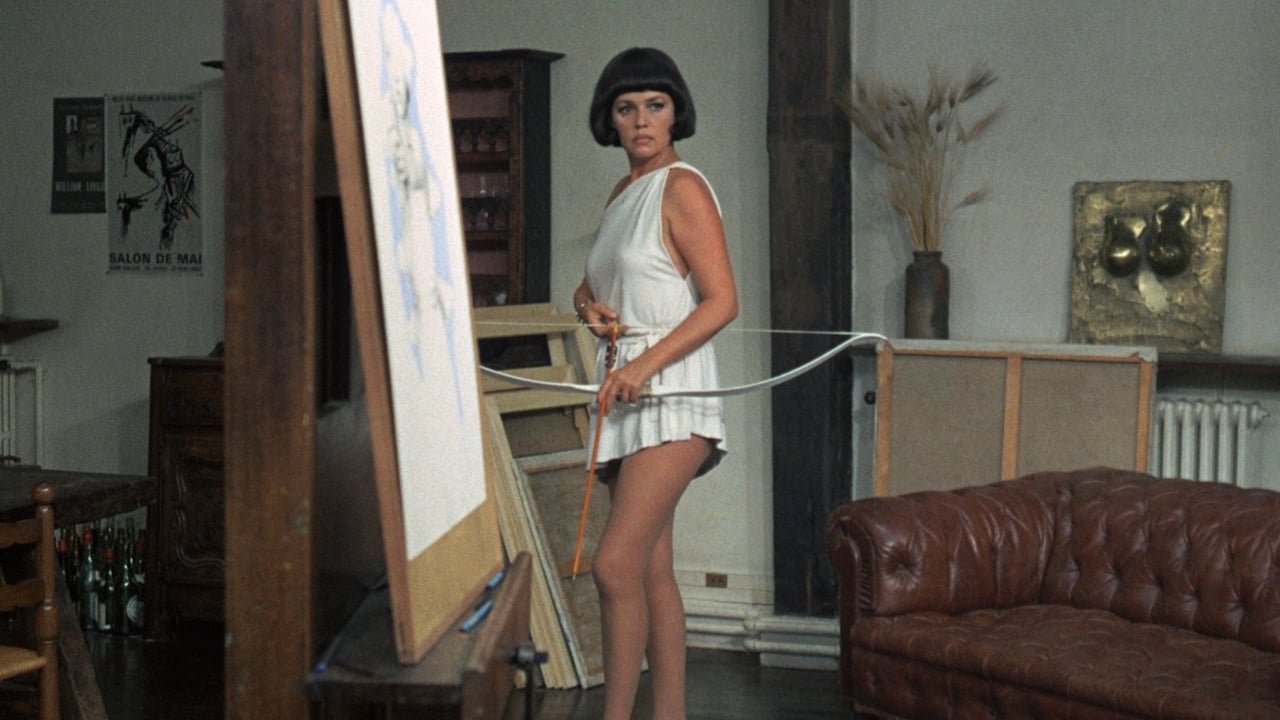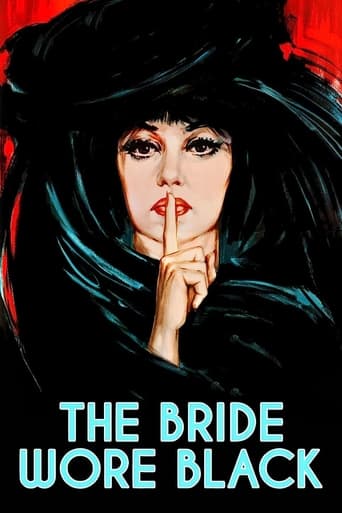ScoobyMint
Disappointment for a huge fan!
GarnettTeenage
The film was still a fun one that will make you laugh and have you leaving the theater feeling like you just stole something valuable and got away with it.
Motompa
Go in cold, and you're likely to emerge with your blood boiling. This has to be seen to be believed.
Richard Burin
In 1968, Jeanne Moreau will... KILL FERGUS. Possibly. Truffaut's Hitchcock homage, which in turn led to Kill Bill, pays tribute more in style than in theme, as Moreau's widowed bride tracks down the five men responsible for her husband's death (I say "responsible", four of them get a pretty bum rap), amidst numerous clever directorial touches (like the camera snaking around the bushes in front a potential victim's house) and to the strains of Bernard Herrmann's superb score. It isn't deep, particularly credible or very well plotted, it's shot in the peculiar "pastel shade" fashion of so many European films of the '60s - that extends even to the actors' skin; it's difficult to distinguish between the many drawings of Moreau and the real thing - and there's a very silly death scene effect that is almost certainly not a joke, but for the most part it's fast-moving and fun, particularly if you like seeing lecherous Frenchmen being killed.
Rodrigo Amaro
The main problem when you want to pay tribute to someone you admire in films is risking yourself to not put the other person qualities and neither yours in it, and in the end a lack of identity is what you get from this tribute. I'm not saying that "La Mariée était en Noir" ("The Bride Wore Black") isn't a good film or that it's not directed by a talented man like François Truffaut but what we see in this film is something that doesn't sound or look like none of his works and don't even get close to the thrills the master of suspense Alfred Hitchcock gave us in his classics, and this is Truffaut's tribute to the man.Jeanne Moreau is Julie, the bride of the title who's on a quest for revenge against five men behind the murder of her future husband during her wedding ceremony. The plot sounds very familiar now after Tarantino's "Kill Bill" series of films, and he claims never heard of this film before. There's plenty of differences in both stories, obviously, but both are very good films.As mentioned, Truffaut pays a tribute to Hitchcock, not only in this being a film of suspense but also working with composer Bernard Herrmann in the musical score, and some elements, sequences and plans created by the master. The film is quite good, has decent performances but it also has some problems too. Herrmann's music is overused and doesn't add nothing to the story; the screenplay is interesting but flawed, never explaining to us how on earth Julie managed to track down these guys, and despite some great revelations as the plot unfolds (when the woman discovers what really happened with her husband) those surprises aren't enough to make us feel intrigued by the story since the heroine is too perfect, nothing goes wrong with her, her plans always seems to work (lack of surprises on this field) and the guys she's after are too soft, there's no evil on them but the way things moves there's no way they could be evil. A little bit of instinct and self defense issues on them would work here but they're so weak. On bowing his head to a great director, Truffaut made a film where's very difficult to see himself, his ingredients or Hitch. Although many actors of his habitual collaborations are present like Moreau ("Jules et Jim"), Michael Lonsdale ("Baisers Volés"), Jean-Claude Brialy ("The 400 Blows"), Charles Denner ("The Man Who Loved Women") among others, and some qualities in style of filmmaking it's very difficult to see his sense of humor, his great sense of rhythm while conducing dramatic scenes, since most of them become very exhaustive to watch or even a cameo role just like great Alfred used to do. The great thing about "The Bride Wore Black" is the fact of being a good film as usual in Truffaut's filmography, never disappoints (just a little). Totally watchable. 8/10
ags123
This is Francois Truffaut's best attempt at doing a Hitchcock film (Lesser efforts include "Mississippi Mermaid" and "Confidentially Yours"). It helps that he's got a story by Cornell Woolrich ("Rear Window") and a score by Bernard Herrmann, whose music can elevate even the trashiest films ("Joy In The Morning," "It's Alive"). "The Bride Wore Black" borrows heavily from several Hitchcock films. Julie Kohler, the main character, resembles "Marnie," a cold, calculating protagonist on a fiendish mission. Both are seen packing a suitcase with new items of clothing, traveling on trains to new destinations and changing hair styles and colors. The plot device of revealing a secret to the audience halfway through in flashback comes from "Vertigo" as do the many unexplained contrivances that test our suspension of disbelief. The film is entertaining largely due to the strange atmosphere it creates and the stylized performance by Jeanne Moreau, seen in nothing but black and white Pierre Cardin outfits. Her usual dour expression suits the character, though she actually smiles for a change on a few occasions. The ending, however far-fetched, serves to satisfy the entire premise. It may take repeated viewings to fully catch all the subtle and not-so-subtle complexities.
herbqedi
I watched this just last night on TCM for the first time. I was sucked all the way in by the film's first ten minutes. Jeanne Moreau is nothing short of brilliant as the wan seductress who lures her victims to her death. There also seems to be a subtext of her wanting to see how pathetic these guys are in the way they treat and regard women. It is as if it is somehow fulfilling to her sense of justice that their lives should be taken not only because of their roles in her groom's shooting and cover-up, but because they are scum compared to the perfect gentleman and best friend that was her bereaved. It is fascinating watching her elicit the desired lust and reactions from her victims as she goes about coldly executing their demises. The music is brilliant and so is the pacing - at least until the third murder when the politician is killed. This is when the politician recounts - at least for us as the audience - what really happened. In some more of the duality that fascinates French directors, the politician describes the death as an accident - which he obviously believes it was. But, we see, the bald, rough-hewn, and obnoxious man not seeming as benign as his colleagues who used these get-togethers for male-bonding and escapism. Despite the narration, it appears that he took dead aim at the groom. Everything about him seems different than the other four unwitting co-conspirators. At least that's the way I saw it - quite different from almost all the other IMDb reviewers.This is why I found the wrap-up of this movie so utterly frustrating. If - as it appears to me - he was the EVIL one among the otherwise feckless crew, then I feel especially robbed of being deprived of her confrontation with him. It is as if Truffaut's joke on us is that in a movie about a woman seeking her own type of "perfect justice", there is no justice when it comes to the execution of the truly guilty one.What was Truffaut truly trying to say? I doubt that we'll ever know. Robert Osborne on TCM said that one of the reasons Truffaut disowned the film is that he had incredible creative differences with his cinematographer - the same fellow he had worked harmoniously with in the past. So much so, that in the last scenes shot for the film (unknown if they were the last scenes of the movie, or as is more typical, earlier scenes), he had Jeanne Moreau direct the scenes so he could walk out and not have to face the vulgarian.For me, this discontinuity had a definite deleterious effect on the finished (or unfinished) product. Is the spartan ending where we only hear the killer's demise in a way that appears rather sloppily engineered compared to her brilliant set-ups of all the others a brilliant philosophical statement by Truffaut or the self-indulgent wrap-up of an artist acting like a spoiled brat because he couldn't get the cooperation he felt he needed? To me, it feels a lot more like the latter and left me cold and disappointed. To each his own.

